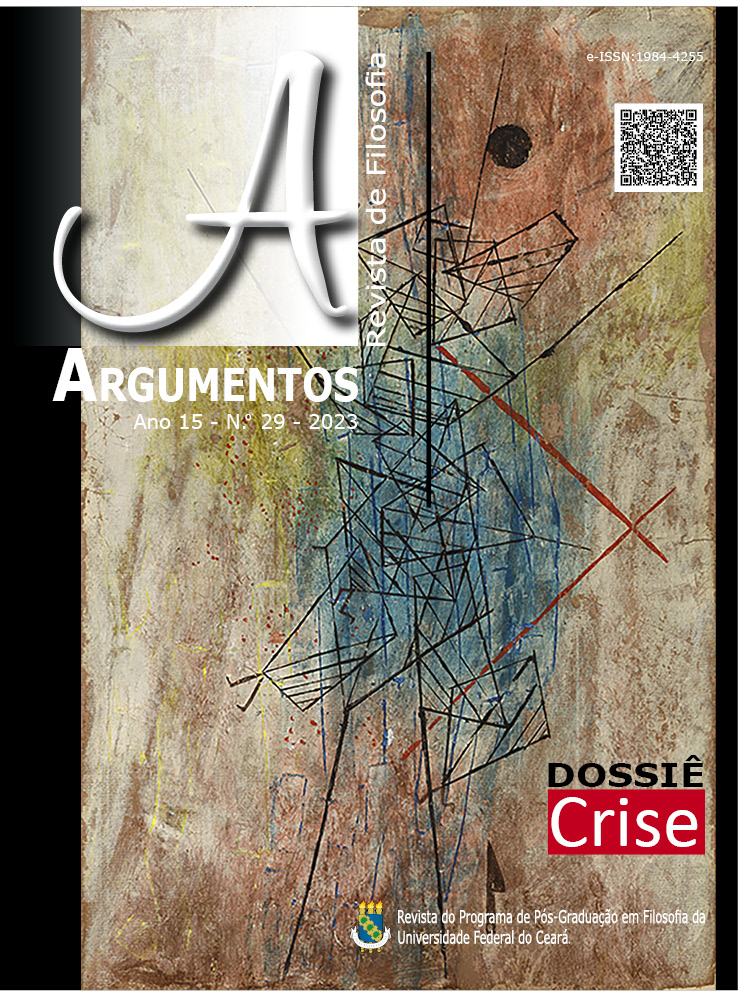“Dialectical thought” in “The Five Elements Theory” in ancient China
DOI:
https://doi.org/10.36517/Argumentos.29.21Palavras-chave:
Theory. Five elements. Dialectic. Conduct. Mutuality.Resumo
The Five Elements Theory is one of the earliest theories in the history of Chinese philosophy. The birth of the doctrine marked a turning point in the process of perception of the world with the five basic elements of metal, wood and water, fire and earth. These five factors are perceived in the form of experience, the level of awareness is still rudimentary, and the most general characteristics of matter have not yet been generalized. However, with the two laws of the Five Elements of mutual birth, the five opposite elements complement each other when explaining the formation, development and transformation of the material world. These are two laws that are applied to explain the laws from nature, to society and the human body. The Five Elements Theory shows that things and phenomena in the universe and society do not stand still, but are always moving, changing and rotating constantly. In this article, we will focus on clarifying the dialectical thought of the theory of the Five Elements in nature, society and in the human body. The article will open up a new approach to the theory of the Five Elements and the next research direction is the application of the theory in oriental medicine.
Referências
ABEND, G. Styles of Sociological Thought: Sociologies, Epistemologies, and the Mexican and U.S. Quests for Truth. Sociological Theory, v. 24, n. 1, 2006, p. 1-41.
CHANG-BEOHM, A.; KYUNG-JUN, J.; HYUN-MIN, Y.; CHEOL-HONG, K.; YOUNG-KWANG, M.; CHUN-HO, S.; JANG-CHEON, L. A Study of the Sa-Ahm Five Element Acupuncture Theory. Journal of Acupunct and Meridian Studies. v. 2, n. 4, 2009, p. 309−320.
CHUNGUANG, R.; XIAOMING, Y. Research on Costume Ideology of the Pre-Qin Period from Perspective of Chu Ci. Asian Social Science, v. 16, n. 4, 2020, p. 59-64.
CONFUCIUS. The Book of Changes. Hanoi: Literature Publishing House, 2007.
CONFUCIUS. The Book of Historical Records. Hanoi: Information Culture Publishing House, 2004.
CUNG, K. T. Philosophical Dictionary. Hanoi: Information Culture Publishing House, 2002.
DU LUN. The Early Zhou Period: Origin of the Idea of Political Legitimacy and the Political Philosophy of Confucianism, “Open Journal Systems, Asian Studies, 5(1), 67–80, 2017.
FUCHS, C. The Dialectic of the Nature-Society-System. Triple C Open Access. v. 4, n. 1, 2006, p. 1-39.
GABRIEL, A. The Meaning of “Theory”. Sociological Theory, v. 26, n. 2, jun./2008.
HEMPEL, C. G. Aspects of Scientific Explanation and Other Essays in the Philosophy of Science. New York: Free Press, 1965.
HUB, Z. Dialectics of Nature as a Vibrant Research Program: Commemorating Friedrich Engels (1820-2020). Journal of Dialectics of Nature, v. 42, n. 12 (Serial n. 268), dec./2020.
JANG, D-S. Constitution classification by the interpretation of physical properties of Yin & Yang and Five Element Theory. Journal of the Korean Mental Science Society, Korean, v. 2, n. 1, 1998, p. 92-99.
JIFA, G.; YIJUN, L.; WUQI, S.; ZHENGYANG, Z. Systems Science and Traditional Chinese Medicine, JAIST Repository, 2007.
LIU, Z. The King’s Power Dominating Society — A Re-examination of Ancient Chinese Society. Journal of Chinese Humanities, 2015, p. 4-24.
SUN, K. C.; SEONGWON, C.; SEO, Y. L. J.; HYUN, P. S. L. The Five Elements of the cell. Integrative Medicine Research Open Access, v. 6, n. 4, 2017, p. 452-456.
TASHA, R. W.; GILLILAND, S. Considering the Yin and Yang of Teaching and Learning: A Resource for the Novice Educator. Medical Science Educator, v. 29, n. 1, 2019, p. 299–306.
USEEM, B. Solidarity Model, Breakdown Model, and the Boston Anti-Busing Movement. American Sociological Review, v. 45, n. 3, 1980, p. 357-369.
VIETNAM Encyclopedia. Hanoi: The Truth Publishing House, 2003.
XINYAN XINYAN. Chinese Dialectical Thinking — the Yin Yang Model. Philosophy Compass, v. 8, n. 5, 2013.
YITZCHAK, J. Recent research on the Western Zhou period: Introduction to the 2019 essays. Archaeological Research in Asia, v. 23, sept./2020.
YUAN, C. Legitimation Discourse and The Theory of the Five Elements in Imperial China. Journal of Song-Yuan Studies, v. 44, 2014, p. 325-364.
ZIMI, M.; CHUNHUA, J.; JIN, G.; HAORONG, G.; YANHUAN, M. Features analysis of five-element theory and its basal effects on construction of visceral manifestation theory. Journal of Traditional Chinese Medicine, v. 34, n. 1, 2014.
Downloads
Publicado
Edição
Seção
Licença
Autores que publicam nesta revista concordam com os seguintes termos (SOBRE COPYRIGHT E POLÍTICA DE ACESSO LIVRE):
1. Autores mantém OS DIREITOS AUTORAIS concedidos à revista OU Direito de Primeira Publicação, com o trabalho simultaneamente licenciado à Atribuição de Licença Creative Commons (CC BY) que permite o compartilhamento dos trabalhos com reconhecimento de autoria e publicação inicial nesta revista.
2. Autores têm permissão para aceitar contratos, distribuição não-exclusiva da versão do trabalho publicada nesta revista (por exemplo: publicar no repositório institucional ou como um capítulo do livro), com reconhecimento de autoria e publicação inicial nesta revista.
3. Autores têm permissão e são estimulados a publicar e distribuir seu trabalho on-line (por exemplo: em repositórios institucionais ou em sua página pessoal) mesmo durante o processo editorial, haja visto que isso pode aumentar o impacto e citação do trabalho publicado.




.jpg)










._._3.png)
1.jpg)
._._._.png)
